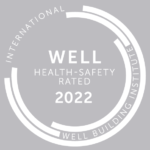Prominent Office Towers Renew Energy Star & WELL Health Safety Status
Workplace productivity is essential to landlords and tenants alike. A major argument in favor of green buildings has always been that productive interiors can pay for themselves, with the cost premiums of better air quality, non-toxic materials, and controllability of systems recouped by greater productivity. evolveEA recently helped two buildings in Downtown Pittsburgh renew certifications that verify high-quality health and energy performance, contributing to the Pittsburgh 2030 District’s goals for building-level energy and indoor air quality benchmarking. The U.S. Steel Tower renewed its WELL Health Safety Rating, ensuring protocols for the wellbeing of its occupants, and we helped near by 411 Seventh Avenue renew ENERGY STAR® certification
U.S. Steel Tower WELL Health Safety Rating

As the tallest building in Pittsburgh, the U.S. Steel Tower is an icon in the city’s skyline. 2022 marks the Steel Tower’s first renewal for the annual WELL Health Safety seal, following its initial participation in the program last year. Administered by the International WELL Building Institute (IWBI), the WELL Health Safety Rating ensures policies and protocols are in place to mitigate the spread of pathogens, increase emergency preparedness, and bolster health services. The U.S. Steel Tower, in partnership with evolveEA, has previously achieved LEED O+M, ENERGY STAR, and BOMA 360, which all require periodic renewals to ensure continuous improvement of the building.
411 Seventh Avenue ENERGY STAR
 Demonstrating a pattern of continuous improvement, 411 Seventh Avenue successfully renewed ENERGY STAR certification in 2022 through a process managed by evolveEA. Owned by Oxford Development Company, the 411 Seventh Avenue Building is a 16-story high-rise building built in 1916 and fully renovated in 1994. Achieving ENERGY STAR certification for buildings that are over 100 years old is an achievement in and of itself, let alone during pandemic years when energy consumption patterns were unusual. Buildings that achieve a score of 75 or higher in the EPA’s Portfolio Manager, indicating that the building performs better than at least 75% of similar buildings nationwide, are eligible to achieve ENERGY STAR certification.
Demonstrating a pattern of continuous improvement, 411 Seventh Avenue successfully renewed ENERGY STAR certification in 2022 through a process managed by evolveEA. Owned by Oxford Development Company, the 411 Seventh Avenue Building is a 16-story high-rise building built in 1916 and fully renovated in 1994. Achieving ENERGY STAR certification for buildings that are over 100 years old is an achievement in and of itself, let alone during pandemic years when energy consumption patterns were unusual. Buildings that achieve a score of 75 or higher in the EPA’s Portfolio Manager, indicating that the building performs better than at least 75% of similar buildings nationwide, are eligible to achieve ENERGY STAR certification.
Optimizing the performance of commercial buildings has supported the success of the Pittsburgh 2030 District, where buildings commit to reductions in energy consumption, water consumption, transportation-related GHG emissions, and improvements in indoor air quality. The program is led by the Green Building Alliance, a national leader in district energy efficiency.
Creating sustainable buildings is a continuous process that does not conclude with the achievement of a certification. It is important to continue monitoring building performance and striving for continued reductions; a process that can be aided by re-certifications, renewals, and participation in regional initiatives like 2030 Districts. To benchmark how your building performs, contact evolveEA today.


